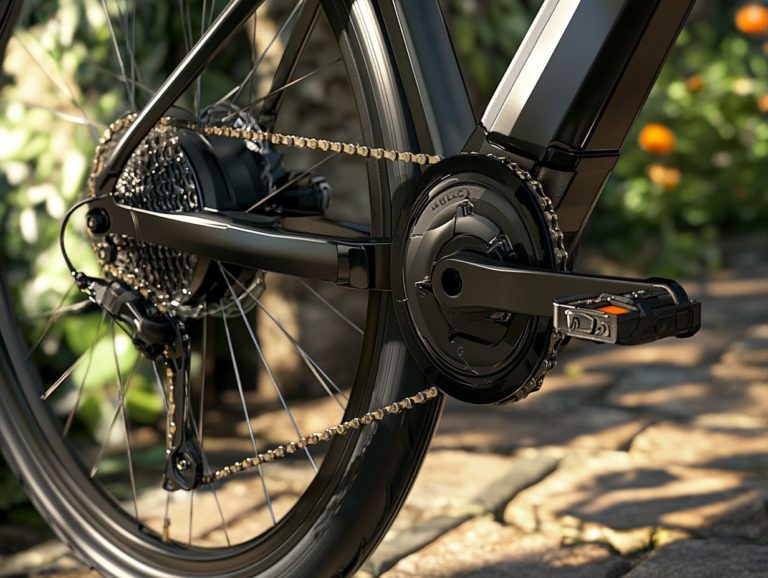Are Electric Bicycles Eco-Friendly?
Electric bicycles are a modern alternative for transportation. Have you considered their environmental impact?
This article explores the eco-friendliness of electric bikes compared to traditional bicycles and motor vehicles. You’ll discover their benefits, like reducing carbon footprints and improving air quality.
We also cover safety regulations and battery disposal. Plus, find practical tips for a more sustainable electric biking experience.
Join us on this exciting journey to explore the greener side of cycling!
Contents
Key Takeaways:

- Switching to electric bicycles is a smart move for the planet!
- Using electric bicycles helps cut down CO2 emissions and boosts air quality.
- Proper maintenance and sustainable battery choices can enhance e-bikes’ eco-friendliness.
What are Electric Bicycles?
Electric bicycles, known as e-bikes, are changing urban mobility. They blend pedal power with an electric motor, making cycling easier.
This combination helps you tackle different terrains while lowering your carbon footprint. E-bikes are an excellent choice for eco-conscious travelers.
Key components include a rechargeable battery, a controller, and an electric motor. Together, they enhance your riding experience.
Top manufacturers like Bosch, Trek, and BionX are fueling e-bike popularity across Europe and North America. More people are embracing this sustainable travel option due to concerns about traffic congestion and the health benefits of cycling.
Environmental Impact of Electric Bicycles
Electric bicycles offer a green alternative to traditional transport. They significantly reduce CO2 emissions, cutting down your carbon footprint.
Their energy efficiency and use of renewable energy make them essential for sustainable transportation. They also help reduce traffic in cities, appealing to eco-conscious individuals.
Comparison to Traditional Bicycles
Electric bikes outshine traditional bicycles with enhanced capabilities. They rely on an electric motor for power, allowing longer distances with less effort.
The motor eases fatigue on climbs, making cycling accessible to more people. Thanks to advancements, e-bikes can now go further on a single charge.
E-bikes are great for commuters wanting to zip through traffic. Meanwhile, traditional bicycles may appeal to fitness enthusiasts seeking a workout. Your choice depends on personal preferences and environmental considerations.
Ready to make a difference? Try electric biking today and contribute to a sustainable future!
Comparison to Motor Vehicles
The comparison between electric bikes and motor vehicles reveals the substantial advantages e-bikes bring to the table in the realm of sustainable transportation. This is primarily due to their classification as zero-emission vehicles, which means they do not produce harmful gases. Unlike traditional cars, which contribute to greenhouse gas emissions and traffic congestion, electric bikes offer a cleaner, more efficient way of getting around the city. They minimize CO2 emissions, encouraging a greener lifestyle.
In fact, the overall energy consumption of electric bikes is significantly lower than that of gasoline-powered vehicles. This makes them a more resource-efficient choice. For more insights on their advantages, including electric bicycle laws and their environmental impact, this reduction in energy use alleviates the pressure on natural resources and enhances urban planning by freeing up valuable space that would otherwise be consumed by parked cars.
As cities grow increasingly congested, adopting e-bikes eases traffic delays and creates a smoother flow of transportation. This contributes to improved air quality and better public health. For more insights, explore the environmental benefits of e-biking. Integrating electric bikes into urban infrastructures is a forward-thinking approach to modern commuting.
Benefits of Using Electric Bicycles

Electric bicycles offer a wealth of benefits that elevate your riding experience while positively impacting urban mobility and environmental health. They present a compelling choice for those seeking sustainable travel options.
By reducing your carbon footprint and enhancing air quality, e-bikes make your commute more enjoyable. They also serve as a convenient mode of transport for both daily commutes and leisurely rides. For those exploring options, understanding the electric bicycle types for eco-friendly travel is essential. It’s no wonder they’ve quickly become a favored option among eco-conscious individuals. Make the switch today and be part of the green revolution!
Reducing Carbon Footprint
One of the primary benefits of electric bikes is their remarkable capacity to reduce your carbon footprint. This is primarily achieved by cutting down on the CO2 emissions linked to conventional transportation methods. As you transition to e-bikes for daily commutes, the collective impact on air quality and urban environmental health becomes increasingly evident.
Research shows that e-bikes can slash greenhouse gas emissions by up to 80% when compared to traditional gasoline-powered vehicles. For instance, a case study in Amsterdam demonstrated that replacing just 10% of car trips with e-bike journeys led to a reduction of nearly 20,000 tons of urban carbon emissions annually. To learn more about the advantages, check out the benefits of riding electric bicycles.
This shift enhances air quality and alleviates traffic congestion, contributing to more livable cities. The broader implications for sustainable transportation are truly profound. As urban areas embrace e-bikes, they set the stage for greener infrastructure, fostering health and well-being while tackling the pressing challenges of climate change. If you’re considering joining this movement, you might wonder are electric bicycles worth the investment?
Improving Air Quality
Improving air quality is one of the standout benefits of adopting electric bicycles. They play a vital role in reducing emissions and fostering healthier urban environments. By choosing e-bikes over gas-powered vehicles, you can witness a remarkable decline in harmful pollutants, ultimately enhancing the overall quality of life in your city.
Consider cities like Amsterdam and Copenhagen, which have masterfully integrated e-bikes into their transportation systems. This shift has led to a noticeable reduction in nitrogen dioxide and particulate matter in the air. Studies reveal that transitioning to e-bikes in these urban areas has resulted in an impressive 20% decrease in air pollution levels.
With cleaner air, residents experience fewer respiratory issues and a drop in hospital visits linked to air quality. As more cities prioritize sustainable transportation options, the positive feedback loop of improved health and well-being becomes increasingly clear. This trend effectively illustrates the true value of embracing electric bike usage in your community.
Concerns About Electric Bicycles
While electric bicycles present a multitude of advantages, it’s important to recognize the real concerns that come with e-bike usage! Valid discussions arise around proper usage, compliance with traffic laws, and the environmental implications of battery disposal. Addressing these issues is crucial to fostering a culture of safe and responsible riding.
As e-bikes gain traction on the roads, discussions about whether electric bicycles are suitable for commuting become increasingly important. It’s essential for riders to understand the best practices for using e-bikes safely. By doing so, we can ensure that the benefits of electric bicycles are fully realized.
Safety and Regulations
Safety and regulations surrounding electric bicycles are vital for enjoying the benefits of e-bikes while minimizing risks in urban mobility. It’s essential to understand and follow the traffic laws specific to e-bike use to ensure the safety of both riders and pedestrians, fostering a harmonious coexistence on the roads.
These regulations often include specific speed limits that vary by region, typically capping e-bikes around 28 mph to promote safer riding conditions. In many areas, helmet laws are enforced to protect riders in case of an accident, highlighting the need for wearing protective gear. Depending on the power output of your e-bike, licensing requirements may also apply.
To encourage safe riding practices, various initiatives like awareness campaigns and community training sessions are available to help you learn the rules of the road and respect your fellow commuters. Together, these measures work towards creating a safer environment for everyone.
Disposal of Batteries

Disposing of e-bike batteries is a serious environmental concern. Improper disposal can lead to hazardous waste and pollution. As e-bikes become more popular, it’s vital to recycle responsibly and use proper disposal methods for these batteries to protect the environment and promote sustainable transportation practices.
Many communities are launching programs to help e-bike users learn about recycling options, which may include designated drop-off locations or partnerships with recycling facilities.
Advancements in battery technology are making waves as researchers strive to create batteries that not only last longer but are also easier to recycle. Innovations like solid-state batteries are safer and more efficient, addressing concerns about environmental impact.
As these improvements take hold, they will play a crucial role in reducing battery waste and fostering a more sustainable future for electric mobility a future you can be a part of!
Tips for Making Electric Bicycles More Eco-Friendly
Enhancing the eco-friendliness of electric bicycles requires a thoughtful blend of regular care and choosing sustainable battery options. By adopting practices that extend the lifespan of e-bikes and their components, you can significantly reduce your environmental footprint and promote greener commuting habits.
Proper Maintenance and Usage
Proper maintenance and usage of electric bicycles are essential for maximizing their longevity and energy efficiency. Conducting routine checks, making timely repairs, and adopting mindful riding habits can greatly improve performance and promote eco-friendly travel.
For instance, monitoring battery health and maintaining optimal charging routines can significantly extend battery life. Ensuring that your tires are properly inflated not only enhances safety but also elevates your riding experience while conserving energy during commutes.
Regular inspections of brakes and gears are equally important for ensuring smooth operation and preventing larger issues down the line. By cultivating these responsible practices, you can enjoy cost savings over time while also reducing your carbon footprint, ultimately making a positive impact on the environment.
Choosing Sustainable Battery Options
Choosing sustainable battery options for your electric bicycle is crucial for minimizing its environmental impact. This decision influences energy consumption and overall sustainability. By selecting batteries that utilize renewable energy sources and are designed with recycling in mind, you can make a significant contribution to eco-friendly practices within the cycling community.
The range of battery technologies available for e-bikes such as lithium-ion, nickel-metal hydride, and the emerging solid-state batteries presents unique environmental considerations throughout their lifecycle. Lithium-ion batteries are popular because they store a lot of energy in a small space. However, the mining processes required for them can pose ecological risks. Conversely, initiatives aimed at recycling these batteries play a vital role in reducing waste and recovering valuable materials. Moreover, the growth of eco-friendly electric bicycle brands highlights a shift towards more sustainable options in the market.
Innovations in battery technology are emerging continuously, leading to longer lifespans and reduced reliance on hazardous components. This enhances sustainability efforts even further. By supporting eco-conscious manufacturers and engaging in recycling programs, you can help champion a greener future for e-mobility. If you’re curious about how these advancements will shape the industry, check out what is the future of electric bicycles? Choosing the right battery is more than just a decision; it’s a chance to make a real difference for our planet!
Frequently Asked Questions
Let’s tackle some common questions about electric bicycles and their impact on our planet!
Are Electric Bicycles Eco-Friendly?

Yes, electric bicycles are considered eco-friendly modes of transportation.
How are electric bicycles considered eco-friendly?
Electric bicycles do not emit harmful pollutants like traditional vehicles, making them eco-friendly alternatives for transportation.
Do electric bicycles use renewable energy?
Some electric bicycles can be charged using renewable energy sources, such as solar power, making them even more eco-friendly.
Are there any environmental benefits to using electric bicycles?
Yes, using electric bicycles can help reduce air pollution and carbon emissions, leading to a cleaner and healthier environment.
Can electric bicycles help reduce traffic congestion?
Yes, since electric bicycles can travel at faster speeds than traditional bicycles, they can help reduce traffic congestion and improve overall traffic flow.
Are there any negative environmental impacts of electric bicycles?
While electric bicycles themselves do not have negative environmental impacts, the production and disposal of their batteries can have some negative effects. However, advancements are being made to create more sustainable and eco-friendly batteries for electric bicycles.






